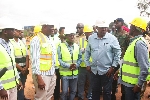The NDC Youth Wing mining policy: A climate action analysis
 Lawson Edem Morttey
Lawson Edem Morttey
The NDC Youth Wing mining policy is an interesting take on attempt to strike a balance between Ghana's economic development and its need for environmental protection. Their commitments to sustainable mining come at a time when the world is facing challenges presented from global climate issues, and their actions show an increased understanding of how both environmental sustainability can be supported by economic sustainability.
Sustainable Resource Use vs. Conservation
Ghana's minerals and mining sector has been a major contributor to the its economy, accounting for about 7% of GDP in 2013 (World Bank - The World bank economic outlook Database)Gold alone accounted for around 90 % of total mineral exports. But all that economic benefit comes at a massive ecological cost in the form of deforestation, water contamination and land degradation.
The standout measure in the policy is to recruit young people for a massive tree planting and care program on unmined land. This will be a critical step in steming the tide and preserving Ghana''s remaining tropical forest as the country losses approximately 2% of its forests annually. This policy, by rehabilitating 100 thousand hectares of degraded land every year in this region alone, could bring nature into a balance and help mitigate the carbon footprint Ghana emanates.
In addition, it seems like a practical step to decentralise regulatory and licensing of more than 900 thousand artisanal miners. Pairing this policy with advanced systems like geofencing, as proposed to secure up to 30% of Ghana's land threatened by illegal mining could vastly strengthen the conservation impact for vital ecosystems.
Jobs from management of resources sustainably
The policy also seeks to ensure employment generation through sustainable mining practices. The International Labour Organization (ILO) projects a rise of 25 million new jobs worldwide by 2030 due to the conversion into green economy. In a country like Ghana, which has an overall unemployment rate of about 4.5 per cent and the youth faces even more grim rates) — this potential in sustainable mining livelihood cannot be overemphasised.
If green resources replaced dying ones, then 50,000 young people every year would be paid — entry-level wages to save our forests. This could also foster local entrepreneurship by spreading job opportunities in a decentralized manner and creating mini mining equipment parks at district level. This could result in the creation of up to 10,000 new jobs at municipalities across Ghana.
Tapping into Ghana’s Youth Talent Pool: the Mining Sector
Skill Development and Capacity Building : This is also one of the focus area in this policy. The idea to transform district offices into internship and practical training hubs speaks volumes in terms of fostering the necessary skills for future career paths, whether it may be mining or environmental management careers.
It is an academic chance which primarily presents itself to Technical and Vocational Education Training (TVET) institutions or the Universities in Ghana. By incorporating policy implementation and environmental management courses into their curriculum, graduates will not only be technically grounded but would also fit logically within the legal and environmental frameworks that govern such operations.
In conclusion, the mining policy of the NDC Youth Wing creates a vision with economic development prior to environmental protection. This policy aims to address current environmental problems and will make the Ghanaian youth as predominant actors of tomorrow paying by keeping sustainable development on top possible. Implementation of these initiatives, if successful, will be a first in the country which sees resources managed responsibly and give other sectors a model to follow.
Note: The author of this piece is Lawson Edem Morttey. He holds certifications in public policy management from UDAID, YALI, and GIMPA. In addition, he possesses a solid foundation in earth resource management, having earned a Bachelor of Science in Geological Engineering from Kwame Nkrumah University of Science and Technology and a Master of Science in Energy and Mineral Resources from RWTH University Aachen, Germany. You can reach out to him via [email protected].
Source: classfmonline.com
Trending News

GFL Secretary-General calls for urgent resolution of TDC–TMA permit dispute
08:15
Foreign Affairs Minister presents six new buses to Ministry staff
08:16
Sir Sam Jonah cries to gov't over alleged seizure of investments in Nigeria
07:14
Why Ofori-Atta can't be extradicted by US: Supreme Court affirms validity of 1931 US–UK extradition treaty in Ghana
02:41
EC stands by December 30 Kpandai rerun date
07:36
Mahama orders $78m payment to Justmoh to resume Agona–Nkwanta road works
08:01
Youth unemployment now a National security concern – Opare Addo
08:43
Parliament approves concession agreement for Accra-Kumasi expressway
08:15
Togbui Kporli Asafo calls for adoption of Ewe numeracy in basic school curriculum
22:55
NSA cracks down on ghost names and payroll fraud, arrests 10
07:35



